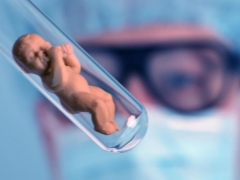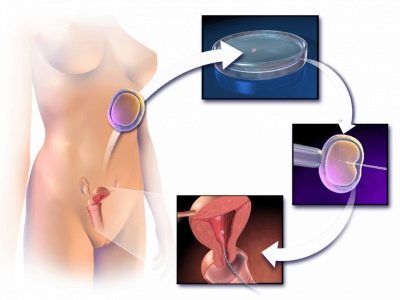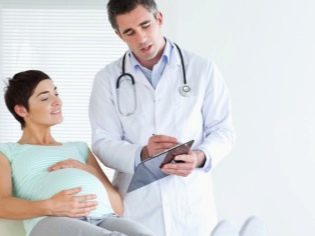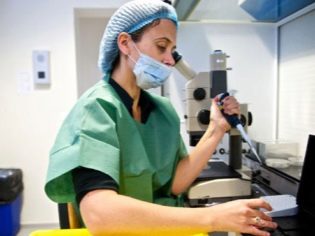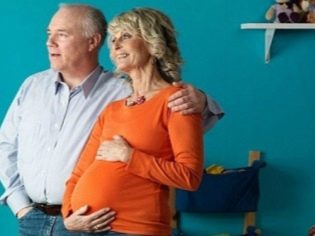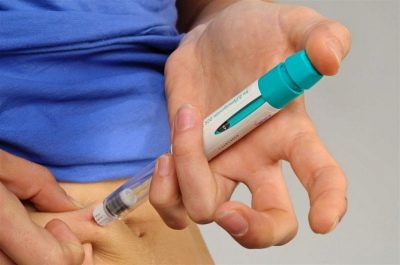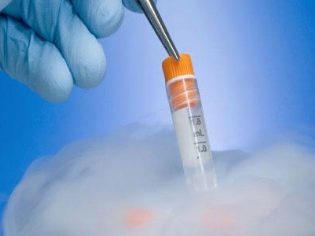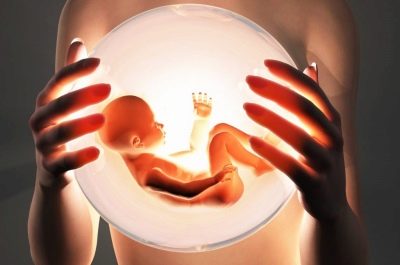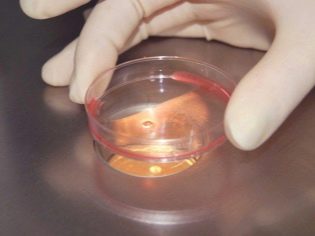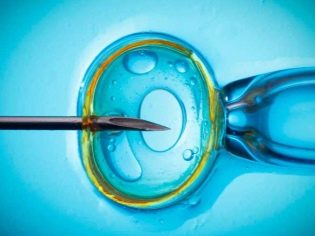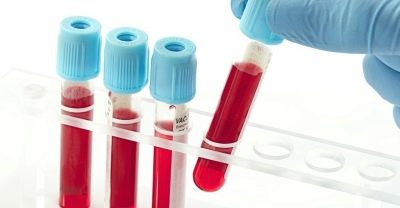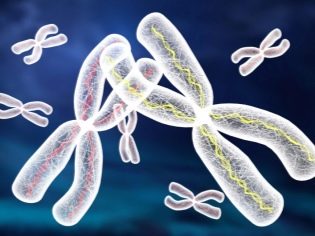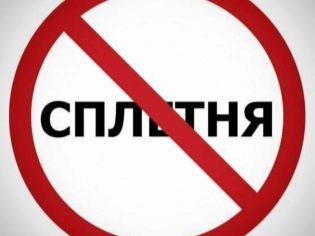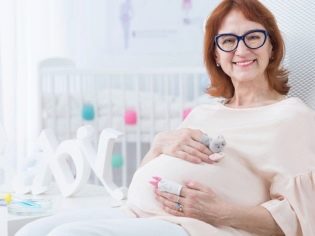How old can IVF be? Features of the procedure after 40 years
Women who are thinking about artificial insemination are concerned with the question - until what age can IVF be done. The policy of compulsory health insurance allows a woman to enjoy the right to free IVF up to 39 years. In other cases, when it is not a matter of state subsidization of the procedure, the question of the maximum allowable age is not as simple as it may seem. Let's try together to find an answer to it in the framework of this article.
Age effect
In vitro fertilization is in vitro fertilization. In the natural conception, the merger of the egg (oocyte) with the sperm cell occurs in the ampullary part of the fallopian tube. With IVF, this merger is performed outside the woman’s body. Previously, eggs are taken from her by the ovarian puncture method, and the man gives sperm.
After fertilization, the doctors observe the development of embryos for several days, after which the most viable of them are transferred to the woman's uterus, where they are implanted and begin to develop, with favorable circumstances, they will become pregnant.
Woman's age affects many IVF factors. First of all, it is the quality of biological material. A girl is born with a supply of eggs for life. But the ovarian reserve is depleted with age, it is affected by the environment, bad habits, toxins.
Thus, the egg quality of a woman is 25 years old and a woman at 45 years old is different. Poor-quality oocytes increase the likelihood of having a baby with severe developmental defects, chromosomal abnormalities.
Age of the woman is important for successful implantation of a fertilized egg in the uterus. The younger the woman, the more functional the endometrium of her uterus, the better his blood supply. In a woman over 35 years old who also had some inflammatory gynecological diseases, possibly performed abortions or operations on the uterus, the endometrium may not be optimal for a quick and successful implantation.
With age, hormonal changes change, which creates many problems not only with natural conception, but also with IVF attempts. Without hormonal stimulation, the procedure rarely ends in success. Even if the implantation is successful, the “age-related” pregnant has higher risks of miscarriage, missed abortion, premature birth, pathologies of the placenta from predisposition to detachment. That is why the age factor is one of the most important when choosing an IVF protocol and in each case it has its own characteristics.
The most successful, according to statistics, are IVF protocols, which a woman under 30 enters. The probability of success of the protocol from the first attempt is at the level of 50-60%. Up to 35 years, the percentage of successful first protocols does not exceed 35-40%. At 38-39 years old, a woman has about a 25% chance of becoming pregnant during the first attempt of in vitro fertilization.
After 40 years the probability of getting pregnant from the first time with a properly conducted IVF and correctly selected by the doctor scheme of stimulation is about 7-10%. In 46-47 years for a woman, this probability decreases to 3%, and in 50 years - to 1%.
It should be noted right away that reproductive specialists do not give a guaranteed result of success at any age. There is no guarantee and can not be.Sometimes pregnancy, despite all the efforts of doctors and patients, does not occur even after 8-10 attempts at the age of under 35 years old, and sometimes it comes literally from the first attempt after 40 years.
IVF can be done at any age up to 50-55 years old, if there is a desire and financial capacity, but at each age fundamentally different schemes and protocols can be recommended.
IVF with own egg cell
For such fertilization are used the eggs of the woman herself. This method is suitable for those who have preserved the function of the ovaries, that is, the maturation of the eggs continues, which is expressed in the regular menstrual cycle without features. It is clear that in 45-50 years not every woman has a menstrual cycle, and even if this is the case, the quality of oocytes leaves much to be desired, and their number is not enough to increase the chances of a successful pregnancy.
Women take ovule cells either after hormone stimulation or in the natural cycle, tracking the time of follicle maturation by ultrasound. The average success rates depending on age are as follows:
- up to 35 years - no more than 35% with the stimulated protocol and no more than 15% in the natural cycle;
- up to 40 years - no more than 25% with the stimulated protocol and no more than 10% in the natural cycle;
- after 40 years - no more than 10% with the stimulated protocol and no more than 5% in the natural cycle without stimulation.
Women tend to overestimate their reproductive abilities. Up to 30 years, it seems that everything is still ahead, and pregnancy can wait, besides, the doctor honestly answers the question that it is theoretically possible to do this in 50 years. Therefore, especially busy women and women are not in a hurry for IVF. Then, at 45 and older, it turns out that the ovarian reserve is negligible, and the quality of oocytes does not allow for normal and strong embryos.
If you want to conceive a child with the use of your own egg, you should not delay the treatment to the doctor - each passing year reduces the chances of positive results. Doctors consider the age limit for conception with their egg cell to be 40-43 years old. This does not mean that the procedure will be denied if the woman is 45 years old, but she will be honestly warned of the negligible chance of success.
If it is not possible to get pregnant in time, you can resort to the procedure of cryopreservation of eggs, so that later you do not have problems with high-quality own biomaterial.
Donor egg cell
Donor eggs will be offered to a woman at any age if she does not have her own in principle, for example, in the absence of ovaries or genetic pathologies associated with the absence of oocytes in the follicles (absolute anovulation). Also, donor oocytes are offered to women of any age, if the quality of their own cells does not allow doctors to get high-quality embryos for replanting.
With the onset of menopause, a woman can also become a mother only on condition of replanting a fertilized donor egg. A child born of such a pregnancy will not be native by the mother’s genes, but if the husband’s sperm was used, it will be the same by the genetic set of the father.
This IVF has certain advantages for "age" women. First, such embryos take root better, and the probability of pregnancy is much higher than when fertilizing their own oocytes of inadequate quality. The risk of having a child with genetic pathologies is also reduced and practically tends to zero, because only young, healthy women with good genetics and health are selected for donating eggs. Secondly, a woman will not have to undergo a hormonal “shock” when stimulating the ovaries.
Usually such IVF is recommended for women after 45 years, but age is not the main thing here, much depends on the state of health and ovarian reserve of the future mother.
Donor embryo
This method of reproductive auxiliary medicine is recommended in case of total male infertility with simultaneous infertility in a woman. If it is not possible to get female oocytes of good quality in the right quantity, and at the same time, the spouse's sperm cells are not able to fertilize the egg even by the ICSI method (with the introduction of sperm with a thin needle under the egg shell), at any age.
In the case of genetic incompatibility of partners, pregnancy cannot occur even if both husband and wife are completely healthy and their biological material is of excellent quality. And then donor embryos also come to the rescue.
The method is recommended for women with a normal state of the uterus, its endometrium, to increase the chances of success. Donor embryos take root, in practice, somewhat worse than their own, because for the immunity of a woman, such an embryo is not even half alien (as happens with IVF with its own egg or natural conception), but completely.
However, in cases of infertility, which were previously considered completely hopeless, it is this technique that allows the couple to find the joy of being parents.
For women over 40
As we already understood, age restrictions are not an obstacle. Important in each individual case, the state of health and causes of infertility. Therefore, “mature” women may well plan their motherhood, the attending physician will surely select an individual IVF scheme for each.
There are several conditions under which a woman after 40 years in Russia will have assisted reproductive health services without significant restrictions.
- Egg stock assessment. For this ultrasound is performed and donate blood for hormonal profile.
- The absence of chronic diseases that interfere with the onset and gestation of pregnancy.
- Portability of the hormones to be used in the protocol.
- Good quality sperm partner or donor sperm.
As a rule, by the age of 40, a woman has one or even several chronic diseases. They can become a significant obstacle, and in some cases they threaten the life of a woman in the event of pregnancy and childbirth (for example, heart failure, kidney, liver, tumors). Therefore, the main feature of IVF for “age-related” patients is a more extensive and detailed medical examination, which is to be completed at the preparatory stage.
In addition to the main list of tests and studies, a woman after 40 will definitely need to visit a genetics. Since the risks of the birth of babies with genetic abnormalities after 40 years of age are significantly increased, the embryologist performs a pre-implantation study of embryos, screening out all embryos with chromosomal abnormalities and leaving only healthy embryos. The geneticist will be able to calculate the probability of healthy offspring in a particular woman and will make an analysis of karyotyping.
At the age of 40+, women admitted to in vitro fertilization, in almost all cases, hormonal stimulation is required. Own level of hormones may not be enough not only for the maturation of the eggs, but also to support the endometrium before implantation. For the schemes, doctors try to use the most gentle and benign drugs that will not harm a woman and will not cause ovarian hyperstimulation.
Since the “age-related” women and men are rather elderly, it is often necessary to use IVF + ICSI. That is, fertilization "does not trust" Mother Nature, and select one of the healthiest and strongest spermatozoid to gently insert it under the egg shell, "saving" sperm from the need to "storm" the oocyte membrane.
The hardest thing for women is to decide on the use of donor eggs or donor embryos.In Russia, unlike Israel, donation between close relatives is not prohibited, thus, a person with whom a woman has a blood relationship, for example, younger sister, can “give” eggs for the procedure. However, it is impossible to use the egg cells of an adult daughter for IVF mothers, if the daughter is born from the same husband, whose sperm is planned to fertilize the oocytes in this protocol. This is incest, and the risk of genetic abnormalities will increase significantly.
A woman over the age of 40 is strongly encouraged to visit a psychologist or psychotherapist during IVF planning to help reduce stress and prepare a woman for possible failure.
Due to the age of attempts there can be quite a lot, and this is best prepared in advance, so that then each unsuccessful attempt would not be a personal drama for the woman and her family members.
Reviews
Women who decide on IVF after 40 years are very often subjected to public condemnation and even censure. They are accused of selfishness (to give birth to one thing, to bring up another thing, which is not easy at that age), they laugh at them, especially if their older children have already grown up and live with their families, and the “grandmother” again wanted to become “mother”.
Therefore, “age-related” pregnant and planning women rarely leave candid reviews and share their joys and failures in the thematic forums. The older a woman is, the harder it is for her to admit to wanting to be a mother again or to experience the joy of motherhood for the first time. Because of this attitude, some even refuse to be able to do IVF, despite the strong desire and financial possibilities.
Psychologists recommend paying less attention to negative statements. This is your life and only yours. If IVF will contribute to the addition of happiness in it, in no case should you abandon the procedure for the sake of ephemeral public opinion.
On the age of women, when you can still use the IVF service, see below.
